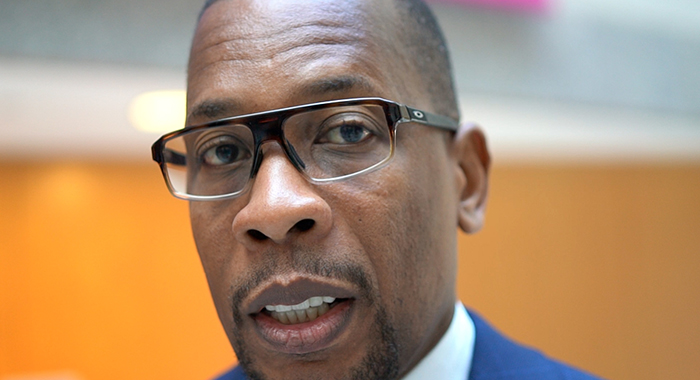By Kenton X. Chance
WASHINGTON, DC — The effect of the tariffs announced by the Trump administration here is not expected to be felt in the Caribbean until the latter part of this year, into 2026, the Governor of the Eastern Caribbean Central Bank says.
However, Timothy Antoine warned that to avoid inflationary pressures due to the levies, the wider CARICOM region must reconsider Miami as the hub for goods exported to and transported within the bloc.
“The big issue is really understanding what that shock will mean and their implication, obviously, for tourism, not in the near term,” Antoine told journalists here on Wednesday.
He spoke after a meeting of Caribbean finance ministers and the Western Hemisphere Department of the International Monetary Fund as part of the Spring Meetings taking place here through Friday.
He said the focus of the talks was the high level of uncertainty about the global economic outlook.
He was speaking one day after the IMF released its latest World Economic Outlook (WEO), which showed that economic growth in Latin America and the Caribbean was projected to moderate from 2.4 % in 2024 to 2 % in 2025, before rebounding to 2.4 % in 2026.
The forecasts are revised downward by 0.5 percentage point for 2025 and 0.3 percentage point in 2026 compared with those in January 2025.
“So what we know for a fact is that growth has slowed, and the projection by the IMF out of this World Economic Outlook is for lower growth for the global economy, for the US and for the Caribbean,” Antoine said.
“The magnitude of that reduction is still up for discussion. And to be honest with you, it will not be resolved until the question of the tariffs, for example, is settled.”
The Trump administration has announced “reciprocal tariffs” on most countries, with those on CARICOM nations ranging from 10 to 38%.

The implementation of most of the tariffs, which were announced earlier this month, has been suspended for 90 days.
“As you know, right now, there are negotiations going on or are expected, and we have to see where the tariffs land,” Antoine said.
He said that he made the point in Wednesday’s meeting that not only is the US CARICOM’s major trading partner but the region imports most of what it consumes from the United States.
“… but 20% of our imports from the US come from third countries, meaning they did not originate in the US. So we have to see what are the tariffs on those countries …. those will be shipped to the US and then come to the region, they will have an effect on us in terms of inflation, a rise in price levels,” Antoine said.
He further noted that half of the tourists who visit Eastern Caribbean Currency Union (ECCU) countries come from the United States.
He, however, said the thinking is that most tourists have already made plans for this year.
“But certainly, we could see in the latter part of the year, next year, we could see some impact on our tourism arrivals,” he said, adding that a slowdown in the US economy “ultimately could and will have an effect on the Eastern Caribbean Currency Union”.
“Clearly, we have to look very seriously now at our logistics hub, where we source and how things are shipped to our region and within the region.”
He said the region depends on the port of Miami for many of its imports but also for intra-Caribbean trade.
“A lot of our trade is being shipped to Miami, for example, on Tropical Shipping, and then coming back down. So even within the Caribbean, we are using US ports for trade,” he said.
Antoine said that Caribbean countries “clearly have to fix that, to make it cheaper, to make it faster and, obviously, to make it more reliable.
“So that is a big discussion that is required, that we must have an answer around what the logistics hub, the trade logistics hub for our region, CARICOM should be.
“Should it be Jamaica? Should it be the Dominican Republic? Should it be Trinidad? Should it be Panama? Those are options we can consider but we need to come up with some decisions around that.”
He said CARICOM must consider these options as well as the impact on food security and health.”
Antoine said there are opportunities amidst the uncertainty.
“Again, this is a moment that cannot be wasted. We have to make a full commitment to really boost food and nutrition security.”
He said the shipping issue is important as regards how goods are moved around the region.
“… if you’re moving food from a surplus country to a deficit country, you’re moving sweet potatoes or yams from one to the next, you need shipping,” he said, adding that that shipping “is not properly established and it needs to be addressed.
“There is also the issue of costs, because, frankly spoken, some of the ultra-processed food, which is driving NCDs —non-communicable diseases — in our region, or in part, those foods are cheaper than locally produced foods and organic foods.
“And we have to address that question because in an environment where budgets are tight, both at the family level —household level — and at the state level, people are going to make decisions based on what they can afford.”
The ECCB governor said it was not a case of simply saying “eat healthier”.
“It is finding affordable, healthier options. And so the investment now in food and nutrition security is going to be really, really important to help bring down those costs.
“That is not easy, that is what we have to do to address both the fiscal situation, economic situation and, as you pointed out, the health situation,” Antoine said.
He said that eight in 10 deaths in the region result from NCDs.
“Just think about the economic cost of that. And then you think about the familial cost, the impact on productivity. It’s a serious issue.”
Antoine said strides have been made in tackling advancing healthy eating in the region.
“… but what we find is that when the economy starts to improve, we see more and more food imports going up,” he said and cited the post-pandemic consumption as an example.
“So, during the pandemic, it went down because things slowed, but once things picked up, food imports went back up, and we are not anywhere close to the target of reducing our food import bill by 25%,” he said, referring to CARICOM goal of reducing food exports by 25% by 2025.
“But we are working on it, and I think this is a moment for us to really make a breakthrough in this area,” Antoine said.






